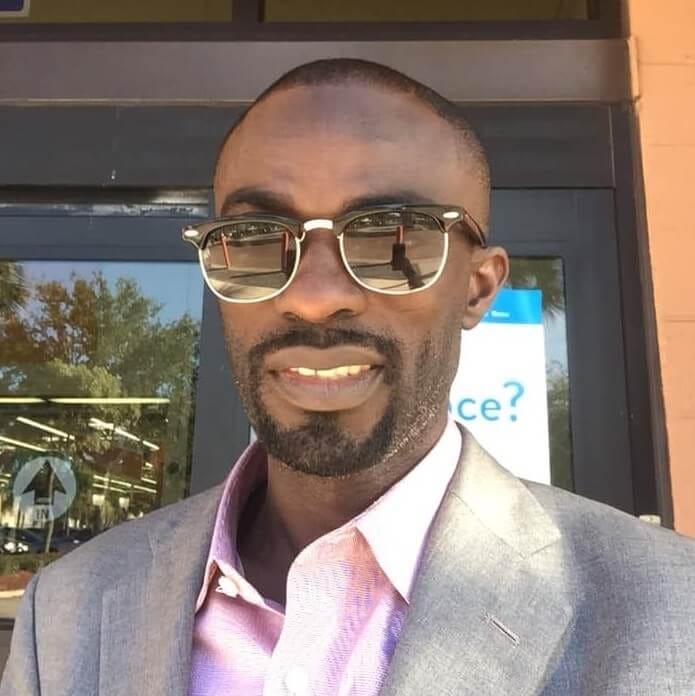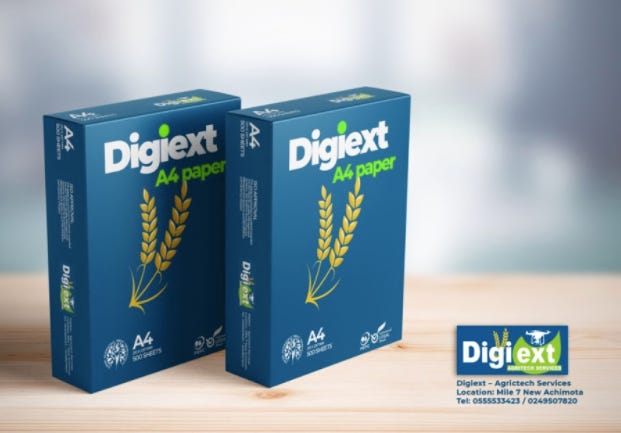Bringing innovation to smallholder farmers
DigiExt is an AgriTech startup founded in Ghana in 2017 and operating out of the US. This week we caught up with their co-founder and CTO, Isaac Owusu Osei to learn more.
What challenge does DigiExt solve?
Exposure to agricultural market volatility. Farmers across the board, but in particular smaller scale farmers, are subject to large price swings in the raw materials/produce that they sell.
By moving farmers further up the agri value chain to processed products we help mitigate the risk of market volatility and ultimately put more money in the farmer’s pocket.
We do this through innovative technologies in digitalisation, mechanisation and renewable energies.
Examples of such products include paper, cooking gas, egg shell powder and 3D bioplastics. Future projects include converting pig waste and other crops into bioasphalt. Thus making the roads we drive on more sustainable.
What were you doing before founding the company?
I was a senior software and network engineering manager. I delivered software and network products to AT&T, Ericsson, CenturyLink, Sling Health and Salesforce.
How did you get DigiExt off the ground?
Largely thanks to funding and support from a few different investors and AgriTech accelerator programs. These include, GIZ, The Combine, Agrominds, and FRAGG Investment Management.
How much money have you raised so far?
$161K. We’re looking to raise another $500K over the coming months.
What went into building the early stage product?
To begin with it was just myself who did the coding. I created three core products - a farm management system, a weather and crop health surveillance system via satellite imagery, and a marketplace for agricultural goods and services.
What’s your tech stack?
React JS, React Native, Redux, RESTFUL APIs, PostgreSQL, Python flask, AWS and Django.
Where do you currently operate?
18 countries spanning North America, Asia, Africa and Europe. In the future we are looking to expand across all of Africa and Asia.
As we see ourselves as a social enterprise we are interested in virgin markets where we can uplift marginalised and lower-income communities whilst creating huge economic impact.
What’s your business model?
We’re B2B. We identify businesses which present opportunities to add value.
Examples:
For our client trotro tractor, an Uber like platform but for tractors, we added drone rentals to their offering.
At AFAP we introduced a robotic cloud-based soil sampler to augment their mass fertilization campaigns.
We helped the Zambian Farmers Union upgrade their supply chain by introducing them to the blockchain and smart contracts.
What metric do you use to measure success?
Economic impact and the number of lives touched. We are a social enterprise that believes in changing the African continent as well as developing countries in Asia in a sustainable way.
As long as millions of youth, women and poor people are elevated from poverty and given the opportunity to build new white collar skills whilst creating value, we believe we are achieving success.
What’s the most useful tool you use in your business?
Precision Digital management systems to accurately quantify ROI and our impact.
What do you love most and least about running DigiExt?
Changing the narrative around agriculture in Africa. Helping eliminate the stigma that farming is for poor, rural folk.
One of the challenges in running DigiExt is that the target audience are not always that tech savvy. This means I have to spend extra time creating user interfaces that are very intuitive.
Another challenge is convincing the target audience to realise the obvious benefits of technological innovation in their trade. E.g. Convincing a farmer that data, record keeping and satellite imagery are important.
Without them physically seeing the tangible benefits upfront makes its less compelling for them.
What companies do you look to for inspiration and why?
M-Pesa. To date they have lifted 194,000 people out of poverty whilst creating a multimillion dollar economic impact.
Grameen bank, known as the bank for the poor, has been granting loans to over 9 million vulnerable people improving their lives and creating a blueprint for microcredit and in the process winning a Nobel prize.
This is very important because over the years charity and handouts have failed the African continent.
It’s about time leaders realise social entrepreneurship is the way forward. Public-private partnerships can help reduce poverty in a practical and sustainable way.
What’s the most important lesson you’ve learnt so far?
Don’t be greedy. Let all in your ecosystem win and you will be the biggest winner. Happy and incentivised experts and partners are driven to bring out their best and it creates loyalty, honesty, trust and outstanding contributions from them.
What are your views on the African tech ecosystem?
It’s growing at a healthy pace and there are lots of opportunities. However, we need leaders to take it more seriously.
They need to be made aware that human resource investment in the STEM subjects is very important for the technological growth of the continent.
If you are an African tech founder or investor and would like to feature in our interview series, you can fill out this form.






Woman be part
Very proud of the work DigiExt is doing. It’s a great attempt to transform Africa economy into a manufacturing and industrialized one.